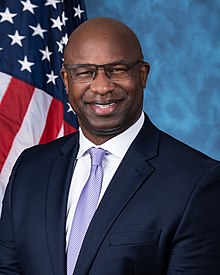
By Stacy M. Brown, NNPA Newswire Senior National Correspondent
Rep. Jamaal Bowman (D-N.Y.) is fighting to retain his seat in New York’s 16th Congressional District in a high-stakes and fiercely contested primary. Bowman, known as the “Hip-Hop Congressman,” recently spoke with the Black Press of America’s “Let It Be Known” digital news show, highlighting the critical issues at the heart of his campaign and the unprecedented financial backing his opponent has received.
Bowman, a fervent progressive, is competing against George Latimer, a centrist, in a race that has seen significant outside spending and harsh personal attacks. Latimer has received significant financial support from AIPAC, which has invested over $14 million in the race, thanks to the backing of well-known individuals like Hillary Clinton. This has made the primary one of the most expensive House primaries in U.S. history, with total spending exceeding $23 million.
During the interview, Bowman expressed deep concern over the influence of big money in politics. “We cannot have a democracy if we allow big money to control our politics and to allow big money and billionaires to buy our elections,” Bowman stated. He accused right-wing billionaires and groups like AIPAC of trying to install a more conservative candidate who would serve their interests. “They are trying to strip the power of the people away through real propaganda that misrepresents my record.”
The primary has emerged as a critical litmus test for the Democratic Party’s stance on Israel. Unlike other races focused on economic issues or support for President Biden, this contest has centered on the Middle East conflict. Following Hamas’s attack on Israel on October 7, which resulted in nearly 1,000 Israeli civilian deaths, Israel’s military response has led to tens of thousands of Palestinian casualties. This has exacerbated the divide within the Democratic Party between staunchly pro-Israel members and those critical of the civilian toll in Gaza.
Bowman condemned the Hamas attacks as war crimes but also criticized Israel’s prolonged bombardment of Gaza. “We need a pathway to peace that doesn’t include the killing of babies, women, and children,” he said. He emphasized that most Americans support a permanent ceasefire, including the release of hostages, and criticized mainstream media for not adequately addressing these views.
Latimer’s record as Westchester County Executive has been scrutinized, particularly his handling of a federal mandate to desegregate the county. Despite campaigning as an advocate for affordable housing, Latimer has woefully failed to meet the requirements of a 2009 consent decree, which ordered the county to build at least 750 affordable housing units and change restrictive zoning laws. Critics argue that Latimer’s administration made little progress, with only 723 units built and several municipalities maintaining exclusionary zoning practices.
Bowman highlighted Latimer’s history of inaction, stating, “He had fought against desegregation since the 90s when he was a county executive,” the congressman asserted. “Even though the federal government demanded that Westchester do more, he has slow-walked that call to action and won’t hold accountable the NIMBY community. Places like Scarsdale and Rye, where he lives, are the people who fund his campaign, and these are the people he works for.”
Latimer’s reluctance to take legal action against municipalities resisting desegregation efforts and his dependence on campaign contributions from affluent, predominantly white communities have been significant points of contention. These issues have largely escaped notice in mainstream media coverage, which has focused more on the personal attacks and financial aspects of the race than the underlying policy failures and implications for racial equity.
Bowman’s grassroots campaign contrasts sharply with Latimer’s corporate-funded bid. “For us, it’s always been about grassroots,” Bowman said. “We are knocking on doors, making phone calls, and doing everything we can to connect with voters so they don’t believe the propaganda that racist billionaires are pushing.”He also criticized the mainstream media’s role in perpetuating pay-to-play politics. “If mainstream media began to criticize pay-to-play politics, they wouldn’t have organizations like AIPAC running ads on their platforms,” Bowman argued. “It’s a plague of plantation politics, where working-class people, particularly of color, remain at the bottom.”
Bowman concluded with a strong message to voters: “We have to push back against the billionaires trying to buy our democracy. Vote for a representative who fights for the people, not the powerful.”

